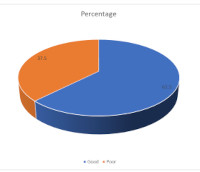Menstrual Hygiene Practices and Associated Factors Among Female Secondary School Students in An Urban Local Government Area of Nigeria’s Niger Delta
Main Article Content
Abstract
Background: Regular maintenance of good menstrual hygiene practices remains a challenge for schoolgirls in most low- and middle- income countries including Nigeria. This study aimed to determine the menstrual hygiene practices among senior secondary school girls in southern Nigeria.
Method: A cross-sectional study involving a two-stage probability sampling method used to select 144 eligible and consenting girls. A structured self-administered questionnaire was used to obtain information. Data was analyzed using SPSS version 26 and statistical significance was set at p value < 0.05.
Result: Mean age of the respondents was 15±1 years. More than half (57.6%) of respondents washed and reused menstrual materials during their last menstrual flow. Handwashing before and after changing menstrual material was practiced by 60.4% of the respondents. 43% of those who used disposable pads disposed them into the toilet. Overall, 62.5% of the respondents engaged in good menstrual hygiene practices and students who used toilet paper to absorb menstruation were twice more likely to also change at least twice a day, wash hands before and after changing menstrual materials, wash genitals with soap at least once a day and appropriately dispose used menstrual materials, than those who used other materials (OR=2.19; 95%CI= 0.43 – 6.36).
Conclusion: Majority of the female students used disposable menstrual pads to collect menstruum but about half did not dispose them appropriately. This reveals the knowledge gap in menstrual hygiene practices among female students and the need for the next level of targeted interventions to enable adoption of right behaviours.
Downloads
Article Details
Section

This work is licensed under a Creative Commons Attribution-NonCommercial-NoDerivatives 4.0 International License.
The Journal is owned, published and copyrighted by the Nigerian Medical Association, River state Branch. The copyright of papers published are vested in the journal and the publisher. In line with our open access policy and the Creative Commons Attribution License policy authors are allowed to share their work with an acknowledgement of the work's authorship and initial publication in this journal.
This is an open access journal which means that all content is freely available without charge to the user or his/her institution. Users are allowed to read, download, copy, distribute, print, search, or link to the full texts of the articles in this journal without asking prior permission from the publisher or the author.
The use of general descriptive names, trade names, trademarks, and so forth in this publication, even if not specifically identified, does not imply that these names are not protected by the relevant laws and regulations. While the advice and information in this journal are believed to be true and accurate on the date of its going to press, neither the authors, the editors, nor the publisher can accept any legal responsibility for any errors or omissions that may be made. The publisher makes no warranty, express or implied, with respect to the material contained herein.
TNHJ also supports open access archiving of articles published in the journal after three months of publication. Authors are permitted and encouraged to post their work online (e.g, in institutional repositories or on their website) within the stated period, as it can lead to productive exchanges, as well as earlier and greater citation of published work (See The Effect of Open Access). All requests for permission for open access archiving outside this period should be sent to the editor via email to editor@tnhjph.com.
How to Cite
References
Critchley HO, Babayev E, Bulun SE, Clark S, Garcia-Grau I, Gregersen PK, Kilcoyne A, Kim JY, Lavender M, Marsh EE, Matteson KA. Menstruation: science and society. American Journal of Obstetrics and Gynecology. 2020 Nov 1;223(5):624-64.
Sychareun V, Chaleunvong K, Essink DR, Phommavongsa P, Durham J. Menstruation practice among school and out-of-school adolescent girls, Lao PDR. Global Health Action. 2020 Jul 30;13(sup2):1785170. Doi: https://doi.org/10.1080/16549716.2020.1785170
Wang YX, Arvizu M, Rich-Edwards JW, Stuart JJ, Manson JE, Missmer SA, Pan A, Chavarro JE. Menstrual cycle regularity and length across the reproductive lifespan and risk of premature mortality: prospective cohort study. British Medical Journal 2020 Sep 30;371. Doi: https://doi.org/10.1136/bmj.m3464
Sinha R, Paul B. Menstrual hygiene management in India: The concerns. Indian Journal of Public Health. 2018 Apr 1;62(2):71-4.
Aniebue UU, Aniebue PN, Nwankwo TO. The impact of pre-menarcheal training on menstrual practices and hygiene of Nigerian school girls. Pan African Medical Journal. 2009;2(1). Doi: https://doi.org/10.4314/pamj.v2i1.51708
Sumpter C, Torondel B. A systematic review of the health and social effects of menstrual hygiene management. PloS One. 2013 Apr 26;8(4). Doi: https://doi.org/10.1371/journal.pone.0062004
Adinma ED, Adinma JI. Perceptions and practices on menstruation amongst Nigerian secondary school girls. African Journal of Reproductive Health. 2008 Apr 1;12(1):74-83.
Kaur R, Kaur K, Kaur R. Menstrual hygiene, management, and waste disposal: practices and challenges faced by girls/women of developing countries. Journal of Environmental and Public Health. 2018 Feb 20;2018. https://doi.org/10.1155/2018/1730964
Azi EI, Maduka O. Substance use and associated factors among junior students in a public secondary school in an urban local government area in Rivers State, Nigeria. Nigerian Journal of Medicine. 2021 Sep 1;30(5):532 – 537.
Kirkwood BR. Essential Medical Statistics. 2nd ed. Malden: Blackwell Science; 2003. p. 420Varghese M, Ravichandran L, Karunai Anandhan A. Knowledge and practice of menstrual hygiene among adolescent girls. Ind. J. Youth Adol. Health. 2015;2(3):35-43.
Hennegan J, Brooks DJ, Schwab KJ, Melendez-Torres GJ. Measurement in the study of menstrual health and hygiene: A systematic review and audit. PLoS One. 2020 June 4;15(6):e0232935. Doi: https://doi.org/10.1371/journal.pone.0232935
Narang, Tanya. Driving diversity, equity and inclusivity in workplaces and education via menstrual health management. International Journal of Commerce and Management Research. 2022; 8 (5):35-46.
Mathur P. Hand hygiene: back to the basics of infection control. The Indian journal of medical research. 2011 Nov;134(5):611. Doi: https://doi.org/10.4103%2F0971-5916.90985

